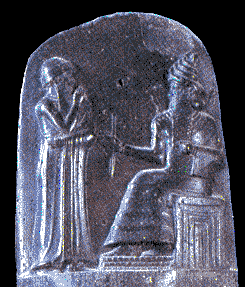|
BACKGROUND
The background to this teaching is found in the book 'Eagles Fly High!'.
DOWNLOADABLE HERE
|
Online links to scriptures (New International Version [NIV] unless otherwise stated) are shown in blue
| NEW TESTAMENT REVELATION ON ATONEMENT
THE BOOK OF HEBREWS (Concludes) |
|
|
| A NOTABLE DIFERENCE BETWEEN OLD AND NEW
|
|
 The Placing of the Golden Altar of Incense in The Placing of the Golden Altar of Incense in
the Most Holy Place: (9:3-4)
This repositioning of the Golden Altar points to the supreme place of intercession, prayer, praise and worship as being the way to enter into the presence of God. This obvious difference and its interpretation are well recognised by most commentators. However it is only now starting to be seriously recognised and embraced by the church. The Tabernacle church movement will fully embrace it.
Hebrews 9:3-4
|
| STILL TODAY’S TWIN THEMES |
|
 1. ACCENTUATING THE POSITIVE 1. ACCENTUATING THE POSITIVE
God’s heart cry is the same today as it has always been – for His people to move on towards maturity, to become one with Jesus, to do the will of the Father through the leading and guiding of the Holy Spirit. Not just to hang on to our salvation by the skin of our teeth!
|
|
|
 2. ELIMINATING THE NEGATIVE 2. ELIMINATING THE NEGATIVE
The dire consequences of deliberately turning our backs on God are no less applicable today than they were in early New Testament times.
While there is provision for the backslider to return to the Lord upon seeking the Lord’s forgiveness, there is only the certainty of terrible judgement upon the one who continually rejects the Lord, having once known Him. The correct theological term for such an action is ‘apostasy’.
|
|
|
 3. EXAMPLES IN THE NATURAL 3. EXAMPLES IN THE NATURAL
King David had a heart after God even though his family was a mess and he committed both adultery and murder. But by throwing himself upon God’s mercy for his mistakes, he was forgiven, growing in maturity to be rewarded with the occupation of the Promised Land.
His predecessor King Saul, on the other hand, continued to deliberately disobey God until he was finally condemned and rejected. These then, are natural examples of the spiritual principles so heavily emphasised in Hebrews.
The same principles still apply today.
|
| THE HEART OF THE QUESTION IS OUR HEART!
|
|
Trying to avoid a theological discussion, but still no doubt getting myself into hot water, there are primarily two schools of thought regarding the relationship between our sin, and God’s grace in the forgiveness of it. Both are justified with supporting scriptures, but only one, in my opinion, reflects the true intent of scripture as a whole.
We have mentioned previously the important principle of the New Testament fulfilling the truths contained in the Old. Therefore to correctly interpret the New, an understanding of the Old is vital. The lack of such an understanding has led to the New being misinterpreted by many in the modern church.
The two differing approaches taken towards the forgiveness of sin are:
|
|
|
1. Easy Christianity:
Or the ‘fairy godfather’ approach! (Obviously the one I disagree with!) In this school of thought you can become a Christian by basically living how you like, provided you repent of your wrongdoings at regular intervals. God’s grace is all sufficient and unconditionally ever available.
Once saved, always saved. The Doctrine of Grace through the death of Jesus overrides all else. No matter what you do, once having been ‘saved’, you are okay now and for eternity, no matter how you live. Now I know this is stating the case in its extreme form, but sadly, these principles form the basis of much of the teaching of the church.
Sin is tolerated, often even acceptable. How sad it is to see so many good people misled.
|
|
|
 2. Walking With Jesus: 2. Walking With Jesus:
The overriding theme of the Bible is one of mankind’s ongoing walk with his Creator. Sometimes we walk in obedience resulting in victory, at other times, in disobedience, resulting in failure. Success was, is, and always will be restored by true repentance. True repentance involves not only seeking forgiveness for a wrongdoing, but also, and most importantly, undertaking to the best of our ability, not to make the same mistake again.
Can you see the difference? The last sentence does not end at ‘seeking forgiveness for wrongdoing’, but includes a commitment to pick ourselves up and to start walking again on the path of righteousness. To walk with Jesus. To walk as He walked. Of course, it can be a slippery path, one from which we often fall off, but He is there to lift us back on, if our desire is firmly resolved to walk on again with Him. For the reality is that we have been saved, we are being saved, and we will be saved, as we continue to walk along life’s path with our Saviour and Lord. Constantly being changed from glory unto glory.
Walking in deliberate disobedience, to be easily repented of at our convenience, is not the true teaching of the Bible.
|
| THE VITAL IMPORTANCE OF ATONEMENT (CLEANSING) TO
TODAY’S CHURCH
|
|
 The ultimate key to entering into the presence of God is found through repentance. For darkness annot co-exist with the light. Sin and God are simply incompatible. Every revival, from the Book of Acts right through into the 21st Century, has been based upon the foundation of repentance to ring about cleansing. The ultimate key to entering into the presence of God is found through repentance. For darkness annot co-exist with the light. Sin and God are simply incompatible. Every revival, from the Book of Acts right through into the 21st Century, has been based upon the foundation of repentance to ring about cleansing.
The Day of Atonement was “The annual day of humiliation and expiation (i.e. making amends) for the sins of the nation.†(Davis Dictionary of the Bible, page 65) While this was done by the High Priest through sacrifices on behalf of the people, the people themselves were to be committed to this cleansing process in the only compulsory fast of the year.
Jesus, of course was and is the one time New Testament atonement or sacrifice for us today. In turn we are to be committed to a cleansing process in our lives too. This feast of cleansing preceded the glorious Feast of Tabernacles, and was a prerequisite for it. Similarly, without cleansing of lives today, there will be no fulfilment of the promised glory of the Church in end times, as has been foretold in the pattern of the Feast of Tabernacles. It is of no use praying for the power to perform miracles and healings, without first being prepared to humble oneself in repentance before our God. To submit to the changes He desires to make in our life, however painful they may be.
We are expected to act out what we believe. Words without actions are meaningless. That is the simple message of the Old Testament Day of Atonement, endorsed and confirmed in the New.
God cannot live with sin. We cannot enter into His presence with sin in our lives. The choice is simple. God or sin! The choice is ours.
|
| <i>NEXT WEEK:</i> WALKING IN THE WAY: OUR JOURNEY THROUGH LIFE
|
|
 Living our life today while preparing for His return. Living our life today while preparing for His return.
|
| A NOTE FROM DAVID |
|
 My heart desire is to see people, including myself, become true disciples of Jesus. My heart desire is to see people, including myself, become true disciples of Jesus.
Jesus called upon us to follow Him. As He was fully committed to His Father and ours, so we are to follow His example. 'Easy Christianity' has no foundation in the Bible.
May we not be seduced by a worldly approach to Jesus.
Ancient Babylonia - The Classical Period
The Old Babylonian period and mainly the Hammurapi Age are generally referred to as the classical period in Babylonian civilization. This is when the "Babylonian" culture really began to develop. The culture was the product of a conglomeration of various ethnic strains, mainly the earlier Sumero-Akkadian civilization that had flourished in the Babylonian plain during the third millennium BC.
|
So until next week.......
MAY GOD BLESS YOU AND YOU BLESS GOD!
His servant and yours

Learn more about us at...
www.wwj.org.nz/about.php
|
A DAVID'S DOODLING
880. Believers believe, while disciples live what they believe.
David Tait
|
Check
out the WWJ website for….
More David's Doodlings: www.wwj.org.nz/dd.php
Eagles Fly High! (Pastors, Teachers and Students): http://www.wwj.org.nz/eaglepts.php
God Facts (A mine of information): http://www.wwj.org.nz/gfacts.php
Facts for Fun: http://www.wwj.org.nz/facts.php
Marriage and Family Facts: http://www.wwj.org.nz/maffacts.php
|

 The Placing of the Golden Altar of Incense in
The Placing of the Golden Altar of Incense in 1. ACCENTUATING THE POSITIVE
1. ACCENTUATING THE POSITIVE 2. ELIMINATING THE NEGATIVE
2. ELIMINATING THE NEGATIVE 3. EXAMPLES IN THE NATURAL
3. EXAMPLES IN THE NATURAL 2. Walking With Jesus:
2. Walking With Jesus: The ultimate key to entering into the presence of God is found through repentance. For darkness annot co-exist with the light. Sin and God are simply incompatible. Every revival, from the Book of Acts right through into the 21st Century, has been based upon the foundation of repentance to ring about cleansing.
The ultimate key to entering into the presence of God is found through repentance. For darkness annot co-exist with the light. Sin and God are simply incompatible. Every revival, from the Book of Acts right through into the 21st Century, has been based upon the foundation of repentance to ring about cleansing. Living our life today while preparing for His return.
Living our life today while preparing for His return.  My heart desire is to see people, including myself, become true disciples of Jesus.
My heart desire is to see people, including myself, become true disciples of Jesus. 